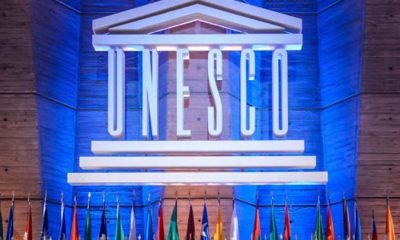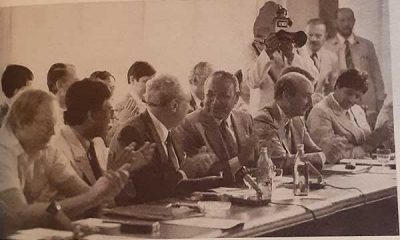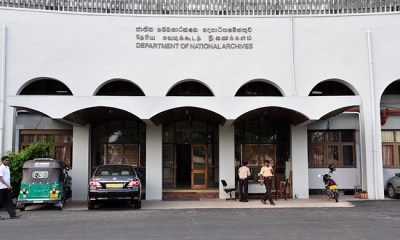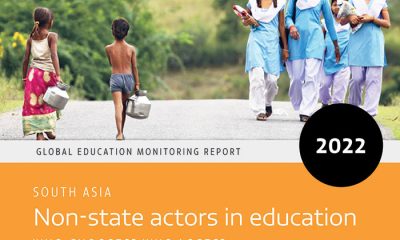Features
UNESCO and having a good time in Paris with Lankan friends

Excerpted from volume ii of the Sarath Amunugama auobiography
“Since war begins in the minds of men, it is in the minds of men that the foundations for peace should be sought’
UNESCO Motto
At the age of 43 I became a senior official of the United Nations Educational, Scientific and Cultural Organization. Is a specialized body of the UN on a par with FAO, WHO and ILO. After the war, by common consent, the UNO was located in New York, while the other four agencies were set up in three major European cities – FAO in Rome, WHO and ILO in Geneva and UNESCO in Paris. Needless to say the relevant host countries were happy to accommodate the UN and provide many local services as part of their responsibility.
A large number of nationals provided basic services while the professional staff represented the UN’s global membership. The first Director-General of UNESCO was the British scientist Julian Huxley, the brother of Aldous, who is credited with writing the motto quoted at the head of this chapter. He established the ground rules of the organization which were very British in character. The DG in my time was Mahtar M’Bow from Senegal who, though alleged to favour Africans, made an attempt to have a fair distribution of positions.
The fact that Sri Lanka was not over represented unlike the Indians and Bangladeshis may have been an added factor in my favour when I became a candidate for the post of Director of the IPDC. India had a strong candidate for the post in Unnikrishnan who was the Managing Director of the Press Trust of India. I knew Unni when he was the PTI correspondent in Colombo before he was promoted to be its General Manager.
He had invited me for some PTI seminars held in Bombay after I became the Secretary of the Ministry of State. I was
lodged in a hotel in the heart of the city which had been the haunt of Krishna Menon when he was a member of the Lok Sabha and Minister in the Nehru Cabinet. The hotel was close to the PTI office. That honour did not work for me since I came down with viral hepatitis after my stay in Bombay.
There was also a whole host of African candidates including a well-regarded Professor of Communications from a Nigerian University. As mentioned earlier, on being selected I was asked to assume duties at the earliest possible date. I replied that I will be available from September 1, 1982.
UNESCO Headquarters is located in two buildings which are close to each other in a salubrious quarter of Paris. The main building designed by Le Corbousier with sculptures by Henry Moore outside and paintings by Picasso inside, is in Place de Fontenoy facing the main entrance of the French Ecole Militaire which is the legendary army school in which Napoleon was trained.
Close-by across the road is the newer ‘Batiment’ [building] built in Brutalist style which houses the Culture and Communications division and branch offices of the embassies of the countries represented in UNESCO. In the basement is also the duty free commissary which is well patronized by the staff and is invariably choc-a-block, particularly on Fridays when the ever thirsty officials stock up for their weekend parties.
The DG, M’Bow, the former Minister of Education of Senegal, was located in the Fontenoy building which had a floor for his administrative staff. He also had an apartment on the top floor in which he lived with his wife and where occasionally he invited us for dinner particularly if it was in honour of a visiting dignitary from our part of the world. Once he invited the visiting Balangoda Ananda Maitriya Thero for a ‘dane’ in his residence, where we were the helper. The reputed monk was very old and not in his proper senses. In his ‘anusasana’ he said that the world was held aloft by tortoises. My friend an Indian architect who translated the priest’s words into French told me that he had edited out a lot of the gibberish so that the highly educated audience would not laugh at the old monk.
Another dinner was held for a few of us who were to accompany M’Bow to New Delhi to participate in it seminar on communication and also meet Indian PM Indira Gandhi. Indira was a fluent French speaker who had represented India in the Governing Council of UNESCO when she was a member of Shastri’s cabinet. So no translators were needed and our DG, who was always nervous about his poor English, had a long and pleasant conversation with the Indian PM.
Secretariat
The IPDC office was located in a tower in the new building in Rue Miollis. Top levels of the tower was occupied by the communications division of UNESCO. Gerard Bolla as ADG ruled the roost from the topmost floor. In the floor below were the ‘intellectuals’ led by Antonio Pasquali [Venezuela] and Alan Hancock [UK] who together with us at IPDC, dealt with the conceptual issues of the New Information Order.
Two floors below were taken by the `engine room’ which comprised of media specialists who provided training and advice to national media institutions of the ‘Third World. They were basically technicians who could fix practical problems of the media. They were led by Pierre Naveaux, a hard drinking Belgian who had been the head of a Film Unit there and his assistant Frank Goodship [Canada].
There were also numerous broadcasters who were led by a Philipino ‘Choy’ Arnaldo. Choy had been with Radio Veritas, the Catholic Broadcasting station located in Manila.
Later Lakshman Rao [India] joined Hancock on a short term assignment. They were a motley crew who were somewhat nervous about the interest in a new Information Order by member states and the establishment of IPDC. Earlier they had an easy time girdling the globe advising radio stations and film units. My challenge was to coopt their services and their budgets to achieve the objectives determined by the Governing Council of IPDC which were to create a transformation in global media capability and its practice.
In the IPDC secretariat I was assisted by Claude Ondobo from the Camaroons who had his work cut out because of the demands of the emerging African countries for both technical assistance
and training. The majority of African members in our governing council came from authoritarian states which were getting a ‘bad press’ in western media and wanted IPDC to do something about it.
Since our focus was on developing countries I encouraged Claude to increase African participation in IPDC activities and also sought funding for those projects by creating ‘funds in trust’ with money from
Scandinavian countries.
Our ADG Bolla also made sure that the IPDC had good secretarial assistance. The leader of our support staff was the experienced Madame Hoareau, an English woman married to a Frenchman, and who had earlier been Bolla’s private secretary. It was a kind gesture on his part to help me who was new to the UN bureaucratic practices which entailed a lot of form filling. I also had the feeling that this placement helped the ADG to keep tabs on the activities of the IPDC.
The UNESCO establishment from M’Bow downwards was apprehensive that due to political interests, IPDC could function outside their chain of command. I am sure that Hoareau would have given good reports about us because Bolls soon began to treat us as his favourites. The second secretary of our office was Nadia, a friendly and capable lady of emigre Russian stock, who by a happy coincidence was earlier married to a Frenchman named Jacques Renault whose family had tea plantations in Talawakelle.
Jacques was close to Sri Lankans in Paris and would unfailingly attend our embassy parties. Nadia had visited Talawakelle as a young bride and had good memories of Sri Lanka though by this time she was divorced and Jacques had married a well-known artist who too was a regular participant at our embassy soirees. Once, when on holiday back home, I visited Jacque’s tea property. The present Tea Research Institute is located on lands acquired from his company before they were restricted to fifty acres by land reform.
There is a beautiful old church on this property, but it is badly neglected now. In addition to the regular staff we also had a young French `stagiare’ who helped Claude with his African projects. This over allocation of resources to IPDC was queried by UNESCO’s staff management committee of which Ananda Guruge was a member. Bolls and I appeared before them and after listening to us the committee decided to approve the current allocation of staff. That was the only time I had to cross swords with the management reviewers of UNESCO.
Paris — `The City of Light’
Right from my school days Paris was the city of my dreams. That fascination may have begun with the stories which Mr. Kannangara, our middle school teacher had spun for us – tales of the Count of Monte Cristo. Once a week he transported us to pre-revolutionary France when narrating the adventures of Jean Valjean and his adversaries. At about the same time we saw films about the ‘Scarlet Pimpernel’ who spirited noblemen away from Paris and the guillotine.
In our University days we were inspired by the French Trotskyites and as supporters of the LSSP read every instruction sent to our leaders by the ‘revolutionaries’ of the Fourth International based in Paris. The struggles between the different lines’ espoused by Trotskyite intellectuals within the Fourth International as played out in LSSP tactics on the ground in Sri Lanka, which varied from time to time, were diligently explained to us by Doric de Souza in his weekly clandestine lectures to us in Peradeniya. As the poet Wordsworth said of the French Revolutionary era, which may well be used to describe us in our youth; “Bliss was it in that dawn to be alive; but to be young was very heaven”.
Though I settled down in Paris in 1982 I had visited ‘The City of Light’ every year since 1977. From my first visit in the 1960s I had attended several meetings in Paris and also spent time with friends there. For instance I was in Paris in 1981 when the French Socialist Party won the Presidency with Francois Mitterand as its candidate. We joined in the partying on the Left Bank which went on till morning and saw red roses, the attractive symbol devised by the ‘avant garde’ marketeers of Mitterand, that were strewn everywhere.
On another occasion, as I have related earlier, I joined the multitude of young men who accompanied the cortege of Jean Paul Sartre for burial at the cemetery in Montparnasse. I had witnessed the massive May Day rallies organized by the CGT or the Communist Party’s Trade Union as it wended its way from the heart of Paris – the Bastille. Equally impressive were the military parades marking the Fourth of July. I naturally looked forward to an interesting stay not only in my new job but also in the wonderfully artistic city which had been mercifully spared the bombings which had obliterated cities like Berlin, Dresden and parts of London.
My first task was to find lodgings till I could get more spacious accommodation when my family arrived. I was lucky in that my many friends helped me to settle in comfortably. Three of my best friends in Paris – Manu Ginige, Premachandra and Navaz – were all living in apartments in a building in Rue de Lilas in Paris 19, close to the Buttes Chaumont. This had been once the Bohemian quarter of Paris and was now a Communist stronghold.
Premachandra was a Communist who had as a young man first migrated to Moscow from Colombo. After some time there he had crossed over to Paris and married Irene, a girl of Greek nationality .He had raised a family of two girls and a boy and was working as a ‘cordon bleu’ chef in Radio France. He was missing Sri Lanka badly and had managed to persuade his friends, Ginige and Navaz, to occupy flats in his building. There was another vacant flat in the building and I rented it.
Our presence was duly noted by other flat mates, many of them Communists, who jocularly called our building ‘Maison Sri Lankaise’ or Sri Lanka House. Prema and his wife loved to cook and most evenings were spent in his or Manu’s flat eating, drinking and discussing politics. Any Sri Lankan politician coming to Paris – but particularly Dharmasiri Senanayake their long standing friend – was entertained by the Premachandras.
All the visitors were asked to bring along were Sri Lankan newspapers and ‘pol’ arrack which he shared with us. Since Prema was a practicing chef who used to cook for the bigwigs of Radio France, he would try out his classical French menus on us. Needless to say we were happy to oblige him and compliment him on his mastery of French cuisine. On some Sundays we would go with him to the local arrondissement market to see him buying fish and poultry after examining and prodding the product.
The local charcouterie staff reserved special cuts of meat for him and the butcher was happy to be complimented by a cordon bleu chef. After about six months in Rue de Lilas all of us began to put on weight because of Premachandra’s sauces and sugary confections. Prema who was smoker into the bargain, got a heart attack to which he succumbed several years later. His only exercise was a Sunday stroll in the nearby park selling the Communist Party newspaper, ‘Le Humanite’.
Another visitor to Prema’s apartment was Esmond Wickremesinghe. He too was fond of good food though he had been warned about his health. Later we arranged an apartment for him with cooking facilities, close to UNESCO headquarters. A staffer from the embassy Abeyratne would cook his cholesterol and sugar free meals as ordered by the doctor. Whenever I hosted a party in my apartment I would invite Ananda Guruge and his wife Sujatha as well as Daniel Lefevre of UTA who also loved good food, to join our gang.
Since Manu and Navaz were embassy staffers at that time I would invariably join them in their soirees. Duty free liquor flowed freely at these parties and friends of Sri Lanka from all professions would congregate to support the embassy. Among the regulars were Bernard de Gaulle, a nephew of the famous leader, Jacques Renault and his wife who were artists, Daniel Lefevre and local heads of travel Companies like Neckermann, Club Mediteranee, UTA and Accor.
Some of the big wigs of French companies operating in Colombo were also present sometimes with their Sri Lankan representatives who were visiting Paris. A smattering of Asian ambassadors and local businessmen were also invited. Though usually it was bitterly cold outside the parties suitably fuelled by hot drinks and chillied curries went on late into the night. Sri Lankan parties were popular since unlike the Indians, Pakistanis and Bangladeshis we served vintage scotch and champagne at our parties.
After Ananda Guruge became the Ambassador he stopped serving liquor and attendance dropped dramatically, especially from among the foreign guests. In Paris there were Embassy parties almost every evening as most countries were represented in France. Each Embassy wanted to outdo the other in attracting the Parisian elite. Good champagne and top of the order whiskeys were a great incentive for inveterate party goers who went from one embassy to another and were not averse to bad mouthing the poorer embassies.
Features
Recruiting academics to state universities – beset by archaic selection processes?

Time has, by and large, stood still in the business of academic staff recruitment to state universities. Qualifications have proliferated and evolved to be more interdisciplinary, but our selection processes and evaluation criteria are unchanged since at least the late 1990s. But before I delve into the problems, I will describe the existing processes and schemes of recruitment. The discussion is limited to UGC-governed state universities (and does not include recruitment to medical and engineering sectors) though the problems may be relevant to other higher education institutions (HEIs).
How recruitment happens currently in SL state universities
Academic ranks in Sri Lankan state universities can be divided into three tiers (subdivisions are not discussed).
* Lecturer (Probationary)
– recruited with a four-year undergraduate degree. A tiny step higher is the Lecturer (Unconfirmed), recruited with a postgraduate degree but no teaching experience.
* A Senior Lecturer can be recruited with certain postgraduate qualifications and some number of years of teaching and research.
* Above this is the professor (of four types), which can be left out of this discussion since only one of those (Chair Professor) is by application.
State universities cannot hire permanent academic staff as and when they wish. Prior to advertising a vacancy, approval to recruit is obtained through a mind-numbing and time-consuming process (months!) ending at the Department of Management Services. The call for applications must list all ranks up to Senior Lecturer. All eligible candidates for Probationary to Senior Lecturer are interviewed, e.g., if a Department wants someone with a doctoral degree, they must still advertise for and interview candidates for all ranks, not only candidates with a doctoral degree. In the evaluation criteria, the first degree is more important than the doctoral degree (more on this strange phenomenon later). All of this is only possible when universities are not under a ‘hiring freeze’, which governments declare regularly and generally lasts several years.
Problem type 1
– Archaic processes and evaluation criteria
Twenty-five years ago, as a probationary lecturer with a first degree, I was a typical hire. We would be recruited, work some years and obtain postgraduate degrees (ideally using the privilege of paid study leave to attend a reputed university in the first world). State universities are primarily undergraduate teaching spaces, and when doctoral degrees were scarce, hiring probationary lecturers may have been a practical solution. The path to a higher degree was through the academic job. Now, due to availability of candidates with postgraduate qualifications and the problems of retaining academics who find foreign postgraduate opportunities, preference for candidates applying with a postgraduate qualification is growing. The evaluation scheme, however, prioritises the first degree over the candidate’s postgraduate education. Were I to apply to a Faculty of Education, despite a PhD on language teaching and research in education, I may not even be interviewed since my undergraduate degree is not in education. The ‘first degree first’ phenomenon shows that universities essentially ignore the intellectual development of a person beyond their early twenties. It also ignores the breadth of disciplines and their overlap with other fields.
This can be helped (not solved) by a simple fix, which can also reduce brain drain: give precedence to the doctoral degree in the required field, regardless of the candidate’s first degree, effected by a UGC circular. The suggestion is not fool-proof. It is a first step, and offered with the understanding that any selection process, however well the evaluation criteria are articulated, will be beset by multiple issues, including that of bias. Like other Sri Lankan institutions, universities, too, have tribal tendencies, surfacing in the form of a preference for one’s own alumni. Nevertheless, there are other problems that are, arguably, more pressing as I discuss next. In relation to the evaluation criteria, a problem is the narrow interpretation of any regulation, e.g., deciding the degree’s suitability based on the title rather than considering courses in the transcript. Despite rhetoric promoting internationalising and inter-disciplinarity, decision-making administrative and academic bodies have very literal expectations of candidates’ qualifications, e.g., a candidate with knowledge of digital literacy should show this through the title of the degree!
Problem type 2 – The mess of badly regulated higher education
A direct consequence of the contemporary expansion of higher education is a large number of applicants with myriad qualifications. The diversity of degree programmes cited makes the responsibility of selecting a suitable candidate for the job a challenging but very important one. After all, the job is for life – it is very difficult to fire a permanent employer in the state sector.
Widely varying undergraduate degree programmes.
At present, Sri Lankan undergraduates bring qualifications (at times more than one) from multiple types of higher education institutions: a degree from a UGC-affiliated state university, a state university external to the UGC, a state institution that is not a university, a foreign university, or a private HEI aka ‘private university’. It could be a degree received by attending on-site, in Sri Lanka or abroad. It could be from a private HEI’s affiliated foreign university or an external degree from a state university or an online only degree from a private HEI that is ‘UGC-approved’ or ‘Ministry of Education approved’, i.e., never studied in a university setting. Needless to say, the diversity (and their differences in quality) are dizzying. Unfortunately, under the evaluation scheme all degrees ‘recognised’ by the UGC are assigned the same marks. The same goes for the candidates’ merits or distinctions, first classes, etc., regardless of how difficult or easy the degree programme may be and even when capabilities, exposure, input, etc are obviously different.
Similar issues are faced when we consider postgraduate qualifications, though to a lesser degree. In my discipline(s), at least, a postgraduate degree obtained on-site from a first-world university is preferable to one from a local university (which usually have weekend or evening classes similar to part-time study) or online from a foreign university. Elitist this may be, but even the best local postgraduate degrees cannot provide the experience and intellectual growth gained by being in a university that gives you access to six million books and teaching and supervision by internationally-recognised scholars. Unfortunately, in the evaluation schemes for recruitment, the worst postgraduate qualification you know of will receive the same marks as one from NUS, Harvard or Leiden.
The problem is clear but what about a solution?
Recruitment to state universities needs to change to meet contemporary needs. We need evaluation criteria that allows us to get rid of the dross as well as a more sophisticated institutional understanding of using them. Recruitment is key if we want our institutions (and our country) to progress. I reiterate here the recommendations proposed in ‘Considerations for Higher Education Reform’ circulated previously by Kuppi Collective:
* Change bond regulations to be more just, in order to retain better qualified academics.
* Update the schemes of recruitment to reflect present-day realities of inter-disciplinary and multi-disciplinary training in order to recruit suitably qualified candidates.
* Ensure recruitment processes are made transparent by university administrations.
Kaushalya Perera is a senior lecturer at the University of Colombo.
(Kuppi is a politics and pedagogy happening on the margins of the lecture hall that parodies, subverts, and simultaneously reaffirms social hierarchies.)
Features
Talento … oozing with talent

 This week, too, the spotlight is on an outfit that has gained popularity, mainly through social media.
This week, too, the spotlight is on an outfit that has gained popularity, mainly through social media.
Last week we had MISTER Band in our scene, and on 10th February, Yellow Beatz – both social media favourites.
Talento is a seven-piece band that plays all types of music, from the ‘60s to the modern tracks of today.
The band has reached many heights, since its inception in 2012, and has gained recognition as a leading wedding and dance band in the scene here.
The members that makeup the outfit have a solid musical background, which comes through years of hard work and dedication
Their portfolio of music contains a mix of both western and eastern songs and are carefully selected, they say, to match the requirements of the intended audience, occasion, or event.
Although the baila is a specialty, which is inherent to this group, that originates from Moratuwa, their repertoire is made up of a vast collection of love, classic, oldies and modern-day hits.
The musicians, who make up Talento, are:
Prabuddha Geetharuchi:
(Vocalist/ Frontman). He is an avid music enthusiast and was mentored by a lot of famous musicians, and trainers, since he was a child. Growing up with them influenced him to take on western songs, as well as other music styles. A Peterite, he is the main man behind the band Talento and is a versatile singer/entertainer who never fails to get the crowd going.
Geilee Fonseka (Vocals):
A dynamic and charismatic vocalist whose vibrant stage presence, and powerful voice, bring a fresh spark to every performance. Young, energetic, and musically refined, she is an artiste who effortlessly blends passion with precision – captivating audiences from the very first note. Blessed with an immense vocal range, Geilee is a truly versatile singer, confidently delivering Western and Eastern music across multiple languages and genres.
Chandana Perera (Drummer):
His expertise and exceptional skills have earned him recognition as one of the finest acoustic drummers in Sri Lanka. With over 40 tours under his belt, Chandana has demonstrated his dedication and passion for music, embodying the essential role of a drummer as the heartbeat of any band.
Harsha Soysa:
(Bassist/Vocalist). He a chorister of the western choir of St. Sebastian’s College, Moratuwa, who began his musical education under famous voice trainers, as well as bass guitar trainers in Sri Lanka. He has also performed at events overseas. He acts as the second singer of the band
Udara Jayakody:
(Keyboardist). He is also a qualified pianist, adding technical flavour to Talento’s music. His singing and harmonising skills are an extra asset to the band. From his childhood he has been a part of a number of orchestras as a pianist. He has also previously performed with several famous western bands.
Aruna Madushanka:
(Saxophonist). His proficiciency in playing various instruments, including the saxophone, soprano saxophone, and western flute, showcases his versatility as a musician, and his musical repertoire is further enhanced by his remarkable singing ability.
Prashan Pramuditha:
(Lead guitar). He has the ability to play different styles, both oriental and western music, and he also creates unique tones and patterns with the guitar..
Features
Special milestone for JJ Twins

The JJ Twins, the Sri Lankan musical duo, performing in the Maldives, and known for blending R&B, Hip Hop, and Sri Lankan rhythms, thereby creating a unique sound, have come out with a brand-new single ‘Me Mawathe.’
In fact, it’s a very special milestone for the twin brothers, Julian and Jason Prins, as ‘Me Mawathe’ is their first ever Sinhala song!
‘Me Mawathe’ showcases a fresh new sound, while staying true to the signature harmony and emotion that their fans love.
This heartfelt track captures the beauty of love, journey, and connection, brought to life through powerful vocals and captivating melodies.
It marks an exciting new chapter for the JJ Twins as they expand their musical journey and connect with audiences in a whole new way.
Their recent album, ‘CONCLUDED,’ explores themes of love, heartbreak, and healing, and include hits like ‘Can’t Get You Off My Mind’ and ‘You Left Me Here to Die’ which showcase their emotional intensity.
Readers could stay connected and follow JJ Twins on social media for exclusive updates, behind-the-scenes moments, and upcoming releases:
Instagram: http://instagram.com/jjtwinsofficial
TikTok: http://tiktok.com/@jjtwinsmusic
Facebook: http://facebook.com/jjtwinssingers
YouTube: http://youtube.com/jjtwins
-

 Opinion5 days ago
Opinion5 days agoJamming and re-setting the world: What is the role of Donald Trump?
-

 Features5 days ago
Features5 days agoAn innocent bystander or a passive onlooker?
-

 Features6 days ago
Features6 days agoRatmalana Airport: The Truth, The Whole Truth, And Nothing But The Truth
-

 Business7 days ago
Business7 days agoDialog partners with Xiaomi to introduce Redmi Note 15 5G Series in Sri Lanka
-

 Features7 days ago
Features7 days agoBuilding on Sand: The Indian market trap
-

 Opinion7 days ago
Opinion7 days agoFuture must be won
-

 Features2 days ago
Features2 days agoBrilliant Navy officer no more
-

 Opinion2 days ago
Opinion2 days agoSri Lanka – world’s worst facilities for cricket fans

























